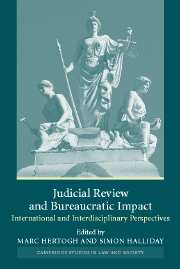Book contents
- Frontmatter
- Contents
- Acknowledgments
- Notes on the contributors
- Introduction
- Part One Conceptual and methodological issues
- 1 Understanding judicial review and its impact
- 2 Conceptual issues in researching the impact of judicial review on government bureaucracies
- 3 Studying bureaucratic implementation of judicial policies in the United States: conceptual and methodological approaches
- Part Two International case studies
- Part Three The future of judicial review and bureaucratic impact
- Bibliography
- Index
1 - Understanding judicial review and its impact
from Part One - Conceptual and methodological issues
Published online by Cambridge University Press: 29 July 2009
- Frontmatter
- Contents
- Acknowledgments
- Notes on the contributors
- Introduction
- Part One Conceptual and methodological issues
- 1 Understanding judicial review and its impact
- 2 Conceptual issues in researching the impact of judicial review on government bureaucracies
- 3 Studying bureaucratic implementation of judicial policies in the United States: conceptual and methodological approaches
- Part Two International case studies
- Part Three The future of judicial review and bureaucratic impact
- Bibliography
- Index
Summary
INTRODUCTION
The project of studying the impact of judicial review raises many questions. For instance, what do we mean by ‘judicial review’ and by ‘impact’? Are we interested in impact on the behaviour of individuals, or on larger social structures, or on something else? Are we concerned with immediate or longer-term impacts? What is the relationship between the functions, purposes and objectives of judicial review and its impact? And, most fundamentally of all, why are we interested in the impact of judicial review? In the first section of this paper, I will suggest that, although various common-law jurisdictions share a basic concept of judicial review, when we look more closely – and I will be focusing on England, and the United States, Australia and India (all at the federal level) – we can identify various models of judicial review, each based on a different set of ideas about its functions and objectives. For this reason, I would argue, the impact of judicial review needs to be studied in a contextualised way by reference to judicial review's objectives and functions. Also, it should not be assumed that, when we discuss the impact of judicial review, we are all talking about the impact of the same thing or, at least, of a single institution with a single set of objectives and functions.
The second section of the paper addresses the question of why we are interested in the impact of judicial review.
- Type
- Chapter
- Information
- Judicial Review and Bureaucratic ImpactInternational and Interdisciplinary Perspectives, pp. 15 - 42Publisher: Cambridge University PressPrint publication year: 2004
- 6
- Cited by

